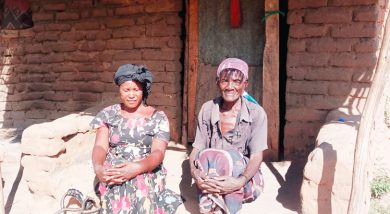Old, neglected and depressed
Elderly citizens in Malawi remain an endangered generation as they are haunted by more than just accusation of witchcraft.
The old guard are increasingly facing the double trouble of dwindling support from their children and taking challenging roles of caring for orphans and vulnerable children.
How the twin changes distress their mental health is largely unknown, but medical doctor Medson Matchaya says the elderly are prone to suffer depression.

“Depression affects people of all ages, but it is common among two extreme generations: the youth and the elderly. For the elderly, it all stems from loneliness, the burdens of taking care of orphans and having no reliable source of funds. They feel alienated from everyone in their communities,”
According to the medic, older people, who feel discriminated because of their age, are likely to suffer from depression.
“Equally at a risk are those that are usually called derogatory names, including those accused of practising witchcraft and other things they are not capable of handling. Lack of understanding of what goes on in the body and mind of a person when they are growing up is a problem,” he says
Although hospitals offer diagnosis, counselling and medication for depression, it is difficult to isolate depressed individuals by just looking at them.
Many older people could be suffering in silence, without getting treatment, because their condition has not been detected.
Matchaya says treating depression in the elderly is particularly difficult because some hospital officials just treat the symptoms without getting to the root of the condition.
The mental complication mainly results from hardships faced by the patients in the environment where they live.
But the elderly remain a neglected population-rarely appreciated for their immense contribution to human kind.
According to Malawi Network of Older Persons (Manepo) national coordinator Andrew Kavala, they are also silently sidelined when they go to seek medical care in the country’s health facilities.
He spoke of hushed exclusion, saying most of the country’s health facilities are not age-friendly.
“There are a lot of depressing things that are said to older people when they visit health facilities. Sometimes they go home empty-handed as some health workers tell them point blank that the services are meant for younger people,” he says.
Sometimes, they cannot withstand jostles and scrambles for treatment in public clinics.
“In some instances, they are pushed to the back of the queue. They end up going back without being assisted. This escalates their pain and depression,” says Kavala.
World Health Organisation (WHO) urges countries to roll back depression by talking about the global challenge.
This is why the United Nations (UN) health agency made ‘Depression: Let’s Talk’ the theme of this year’s World Health Day.
In a statement ahead of the commemoration, WHO director of mental health Dr Shekhar Saxena says reducing depression begins with better understanding of the mental condition and how it can be treated.
“This is just the beginning,” the mental health specialist says. “What needs to follow is sustained scale-up of mental health services accessible to everyone, even the most remote populations in the world.”
Manepo has joined the global Age Demands Action (ADA) campaign to end age-related discrimination.
As part of the grassroots movement against discrimination, the local organisation is working hand in hand with the elderly to enlighten the masses on how the senior citizens are deprived of quality health services for depression and other disorders because of their age.
The campaign also shines the light on how the deprivation triggers cases of depression.
Matchaya underscores the need to offer the elderly unrestricted access to health services, censuring some health workers for leaving the time-honoured group behind.
He says: “Assisting the senior citizens live a better life is a multifaceted task not just for us working in the health sector. Every sector in the country needs to take a role.
“It will be important for traditional and religious leaders to take part in lobbying for better treatment for these senior citizens. This is so because most of the cases we treat emanate from the bad treatment the people are given in their communities.”
Kavala expect health facilities in Blantyre becoming yardsticks and models for other district health offices across the country.
“It is crucial to guarantee increased access to health services for older people, including treatment for depression, because they are Malawians just like any other,” he says.
According to Manepo, there are about 800 000 elderly persons in the country.
WHO estimates that more than 300 million people are now living with depression.
Dwindling support for people with mental disorders, coupled with a fear of stigma, prevent many from seeking the treatment they need to live healthy, productive lives. n





